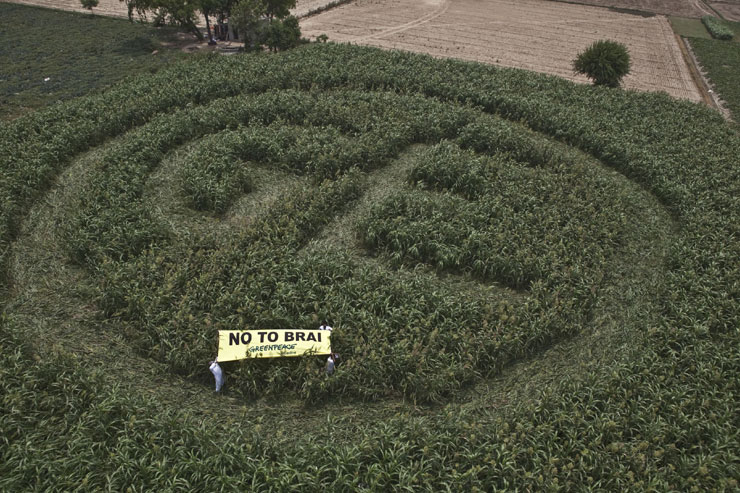BRAI Bill Offered For Public Consultation, Crop Circles Appear Opposing The Bill
By Greenpeace India
13 June, 2013
Countercurrents.org

Photo/ Sudhanshu Malhotra/Greenpeace
The controversial Biotechnology Regulatory Authority of India (BRAI) bill which was introduced in the Lok Sabha in April has been released for public consultation on June 11. Once tabled in Parliament, BRAI will be a regulatory authority for all Genetically Modified Organisms including controversial genetically modified (GM) crops in the country. However, the bill has faced vehement opposition from MPs, civil society and the public at large because BRAI will provide an easy single window approval mechanism for genetically modified food crops in India. GM crops can be detrimental to human, animal and environmental health and to livelihoods dependent on farming.
The Parliamentary Standing Committee for Science and Technology, Environment and Forests in charge of reviewing the bill, has advertised for views and suggestions from the public and organisations on the BRAI bill to be sent within one month. On June 11, Greenpeace wrote to Dr. T Subbarami Reddy, Chairman of the Parliamentary Standing Committee urging him to increase the time limit for public consultations for the BRAI bill from 30 days to at least 90 days.
Neha Saigal, campaigner, Sustainable Agriculture, Greenpeace India says, “The 30 day limit, starting from today, for the public to comment on the BRAI Bill, which is going to impact every citizen, our health, our environment, our livelihoods, our food and farming is very short. This would not suffice if one wants to get adequate public participation on a legislation of this gravity.”
Greenpeace has been opposing the BRAI bill because it lacks a scientific bio-safety assessment at a time when there is increasing scientific evidence that points to the adverse impacts of GM crops on human health, biodiversity and farming. State governments and civil society organisations are also agitated due to the absence of any decision making roles for state governments and clauses to over-ride the Right to Information Act in the current BRAI Bill. (For more info: http://indiagminfo.org/wp-%20ree-india.pdf%29content/uploads/2013/03/Scientific_Papers_Compiled_March_2013_coalition-for-a-gm-f/)
To bring attention to this grave threat to our food and farming Greenpeace volunteers from across the country initiated a novel idea of crop circles in different parts of the country. The crop circles aim to create awareness about the imminent threat from alien genes in our food.
On June 7, a giant crop circle was formed in Najafgarh near Delhi. The design in a field featured a slash over 'GE', as a mark of protest against the government's decision to introduce the BRAI bill since it provides a simple clearance mechanism to GM crops. Similar crop circles were created in Ahmedabad and Bangalore as well.
Pranay Jasodia, a student from Mumbai and one of the volunteers who created the crop circles says, “Safe food is my right and GM crops are the biggest threat to it."
Currently Bt cotton is the only approved GM crop in India. The last 11 years of Bt cotton cultivation has shown the monopoly of the Indian cotton seed sector by a single multinational company through their patented gene in Bt cotton. Monsanto has even dragged state governments into court to increase their royalty and profits.
Keeping in mind all these factors and the increasing scientific evidence proving the dangers of GM food and GM crops, Greenpeace demands that the Government of India withdraw the BRAI Bill and instead put in place a robust Biosafety Protection Regime.
Comments are moderated


